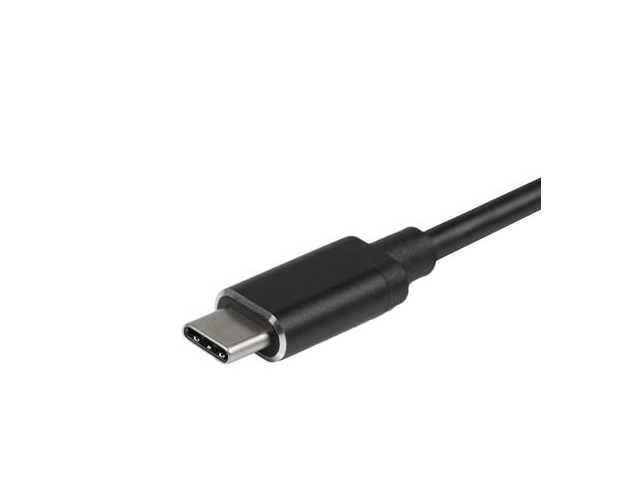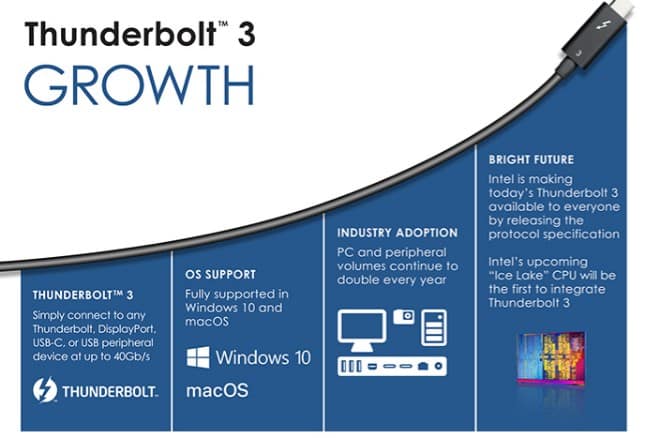Intel shares Thunderbolt with USB Promoter Group, and USB4 is on the way

Intel's Thunderbolt 3 uses the USB-C connector, which is sort of confusing. Basically, all TB3 ports can also handle USB, but standard USB Type C ports cannot work with Thunderbolt 3. This can lead to confusion for consumers. Intel's standard is much faster, meaning Thunderbolt 3 accessories are often superior to regular USB-C models. Of course, TB3-related things are usually more expensive too.
In an effort to make Thunderbolt ubiquitous, Intel is sharing its TB protocol with the USB Promoter Group. What does this mean? Well, the future of the Universal Serial Bus, USB4, will not only work with USB 2.0 and 3.x devices, but Thunderbolt 3 too. In other words, by having a USB4 port on your computer, you also have TB3.
ALSO READ: Satechi launches elegant USB Type-C Aluminum Monitor Stand Hub for Apple iMac
"Intel is well on its way to making the innovation delivered with Thunderbolt 3 available to everyone. Today, Intel announced that it contributed the Intel Thunderbolt protocol specification to the USB Promoter Group, enabling other chip makers to build Thunderbolt compatible silicon, royalty-free. In addition, the USB Promoter Group announced the pending release of the USB4 specification, based on the Thunderbolt protocol. The convergence of the underlying Thunderbolt and USB protocols will increase compatibility among USB Type-C connector-based products, simplifying how people connect their devices," says Intel.
ALSO READ: Tripp Lite Isobar surge protectors finally get USB charging

The USB Promoter Group explains, "The new USB4 architecture defines a method to share a single high-speed link with multiple end device types dynamically that best serves the transfer of data by type and application. As the USB Type-C connector has evolved into the role as the external display port of many host products, the USB4 specification provides the host the ability to optimally scale allocations for display data flow. Even as the USB4 specification introduces a new underlying protocol, compatibility with existing USB 3.2, USB 2.0 and Thunderbolt 3 hosts and devices is supported; the resulting connection scales to the best mutual capability of the devices being connected."
ALSO READ: Philips unveils pair of premium monitors with Windows Hello and USB-C docking
The group shares the following features and benefits of USB4.
- Two-lane operation using existing USB Type-C cables and up to 40 Gbps operation over 40 Gbps certified cables
- Multiple data and display protocols to efficiently share the total available bandwidth over the bus
- Backward compatibility with USB 3.2, USB 2.0 and Thunderbolt 3
ALSO READ: ADATA announces svelte and speedy UE700 Pro USB 3.1 flash drive
Brad Saunders, USB Promoter Group Chairman offers the following statement.
The primary goal of USB is to deliver the best user experience combining data, display and power delivery over a user-friendly and robust cable and connector solution. The USB4 solution specifically tailors bus operation to further enhance this experience by optimizing the blend of data and display over a single connection and enabling the further doubling of performance.
ALSO READ: Plugable launches tool-free NVMe SSD USB-C enclosure for Windows, macOS, and Linux
Intel is wise to open up its Thunderbolt protocol, as it will make it available to more users -- an essential step for its continued success. Ultimately, consumers will be the big winners, which is quite refreshing. There is a lot of confusion surrounding the upcoming USB 3.2, and hopefully USB4 will restore sanity to the world of USB.
ALSO READ: VisionTek Portable 1TB Thunderbolt 3 SSD [Review]
With that said, you shouldn't expect any USB4 devices until 2020 at the earliest. Thankfully, Microsoft is already backing the standard for Windows, as Roanne Sones, Corporate Vice President, Microsoft OS Platforms explains below.
USB4’s high throughput and advanced features enable new scenarios in consumer, enterprise, and intelligent edge markets, while maintaining interoperability with existing USB and Thunderbolt 3 devices. We are excited to work with our partners in the ecosystem to bring USB4 to market and showcase its benefits.
Are you excited for USB4? Please tell me in the comments below.